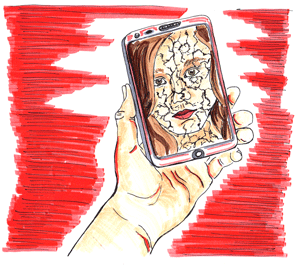The staff editorial is the majority opinion of The Murray State News Editorial Board.

Always connected, lazy, self-reliant, hopeful, impatient – millennials are called a lot of things, and not all of them are good.
We are also called a several variations of “generation:” Generation Y, Digital Generation, Net Generation and, most relevantly, the Selfie Generation.
We post pictures of our smiling faces as advertisements for every event we attend, meal we eat and good hair day we have.
We have moved from capturing the moment itself to capturing ourselves in the moment, with the main goal often being to then capture sufficient likes and comments.
Here’s the caveat, though: enough is never enough.
Because it’s not just, “I was here,” it’s “I was here – envy me.”
We have outsourced our personal brands to a digital society that tells us our approval ratings will suffer if we don’t post pictures often, at the right angle and with the right lighting and filters.
Selfies have not only influenced our lives, but an entire industry as well. Selfie sticks, mobile photo editing apps, filters, Snapchat, Instagram and countless other products and brands have latched onto our need for likes and have turned a massive profit off it.
Campaigns have been launched not only in favor of selfies, but in defiance of them. We see individuals and national brands coming out with #LoveYourself and #NaturalBeauty type initiatives that preach body positivity, all while ironically pushing more selfies into an approval-craved, algorithm-based social media society.
Many have reached celebrity status on Instagram by garnering hundreds of thousands of followers and averaging tens of thousands of likes on their daily, sometimes hourly, posts – beautiful, “real” people living beautiful, inauthentic lives.
There was a time when people were worried young girls and boys based their self-worth and image on the unobtainable beauty of models in magazines. Now, there’s a whole new pressure.
People flock to Instagram to follow “real,” “normal” people on Instagram because they’re beautiful and because these people are often advocating a healthy lifestyle – validating the people in the pictures with each like, while knocking themselves down a ladder that was too unsubstantial to climb in the first place.
One “Instagram famous” individual spoke out recently about her fabricated fame and how dangerous it became.
Essena O’Neill once had more than 500,000 Instagram followers, until she overhauled her life. She now has 35,600 followers and her Instagram bio section includes the statement, “Social Media is NOT real life.”
Also, according to The Guardian, O’Neill reflected upon her Instagram-centered lifestyle and called it what it was: “contrived perfection made to get attention.”
We couldn’t have worded it better ourselves.
So before you take another photo, think about why you’re taking it and who you’re taking it for.
Are you taking it to preserve a memory or to inflate your ego? How finely are you treading the line of self-confidence and narcissism?
Human beings have always had an inherent need to prove we exist in this world, and understandably so. The fear of being forgotten – of not leaving a mark – is staggering.
Live a life worth remembering and document it if you must – at a certain point you will have to look up from your screens to do so.